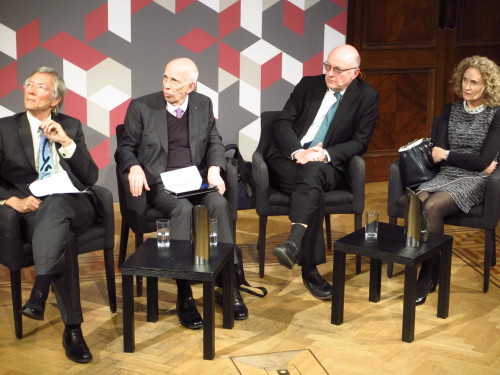
Brexit panel: left to right are Rolf Tarrach, Ole Petersen, Mark Ferguson and Gail Cardew.
By Hamish Johnston
Here in the UK it’s easy to forget that our exit from the EU could have significant unintended consequences for scientists in the remaining 27 member nations.
Yesterday, I was at a public forum called “Brexit: the scientific impact”, which was held at the Royal Institution in London. While there was much discussion about domestic challenges, the second session – “Brexit: the scientific impact on the EU-27” – provided a fascinating insight into the challenges facing the UK’s neighbours.
Perhaps the most important thing that I learned is that the UK has played a very active role in shaping EU science policy. What’s more, this activism will be sorely missed by some other EU countries that have relied on the UK as a powerful ally in Brussels.
In particular, there is a group of countries that includes the UK, the Netherlands, Denmark and Sweden that all have similar university-based models for doing scientific research. This is in contrast to countries such as France, Germany and Italy, which tend to favour research done at national laboratories such as Germany’s Max Planck Institutes.
A Swedish scientist in the audience expressed the fear that once the UK has left the EU, support in Brussels for the university-based research model in Sweden will be under threat.
On a positive note, Rolf Tarrach of the European University Association pointed out that British scientists currently receive a disproportionally large amount of funding from the EU. Does this mean, he asked, that EU-27 scientists should be looking forward to a greater share after Brexit?
Mark Ferguson of Science Foundation Ireland said that his country was very keen on poaching UK scientists who would like to remain working on EU projects. He did, however, concede that overall it looks like Brexit will have a negative effect on Ireland.
Another possible upside for the EU-27 is that the loss of such a large and influential scientific partner as the UK could force a post-Brexit EU to be more outward looking in terms of international collaborations. Indeed, if all goes well with Brexit negotiations, the UK will continue to participate in many EU science programmes – and this could provide a useful model for other non-EU countries to join in.
Guidelines
Show/hide formatting guidelines
this text was deletedwhere people live in harmony with nature and animals</q>
Some text